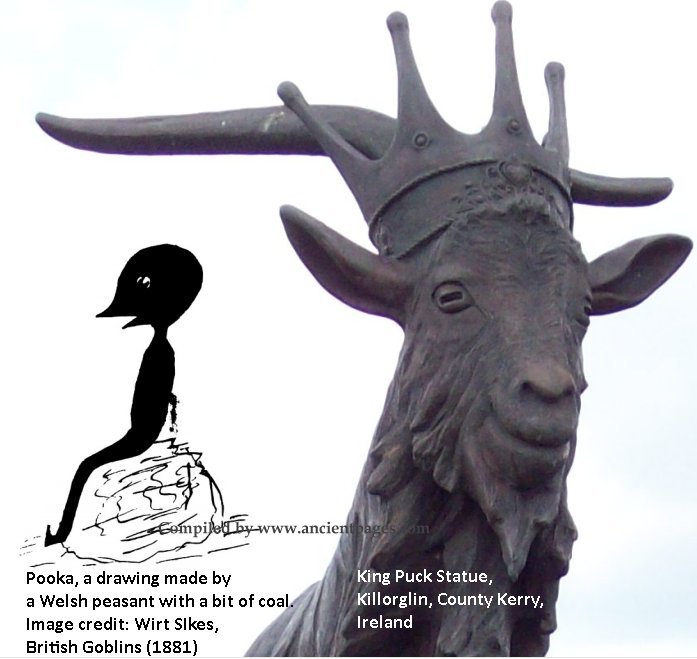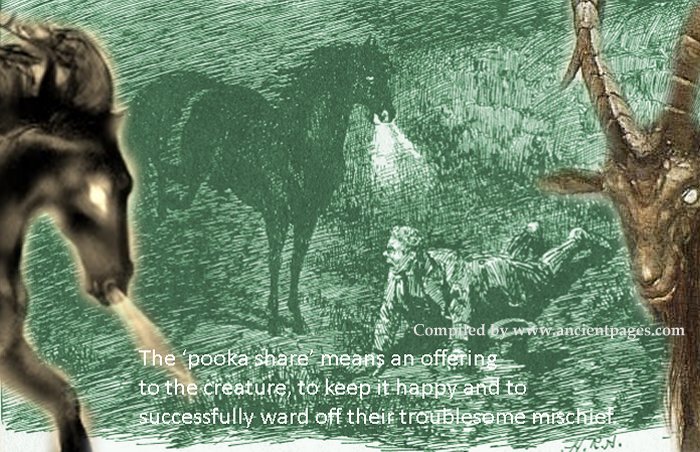Mischievous Irish Pooka, Shapeshifter And Prankster Has Its Counterparts
A.Sutherland - AncientPages.com - In our earlier article on AncientPages, we described Pooka, a prankster and a shapeshifter that could take many forms from a black horse to a human.
Pooka is known to be one of the most famous, evil, and feared faeries in Ireland, associated with both good and bad luck.
Tales of very similar creatures are widespread in other parts of the British Isles and even further south in Normandy, France, especially among the Celtic cultures of Northwest Europe.
The Pooka is not unique to Ireland. Ancient Cornish myths and legends tell about a small, human-like creature (a kind of hobgoblin) known to ancient people as ‘bucca’. Similar to the pooka that usually troubles people on the ground, the Cornish hobgoblin bucca, lives among fishermen and can help them or make various troubles to them when not appeased.
The tradition says that bucca goblin, also identified as the ‘black spirit’, had once much better reputation and was a Celtic sea god who declined to the status of demon or hobgoblin. Similar to the Irish pooka is also another prankster that originates in the Cornish lore. This black creature - known as the buggane - also can suddenly change its shape and deliver many troubles.
Many people don’t really understand why, because there are no records of any incidents of the pooka or bucca or another goblin, actually causing a human any harm.
Likewise, there are no known records of capturing any of them or taking photographs, but … just in case, people continue an old tradition to keep these creatures calm and happy.
To stay in good with the bucca, fishermen traditionally leave a fish from their latest catch on the sand or/and toss a piece of bread over their left shoulder and spill a little bit of their beer on the ground. It keeps the bucca quiet and happy.
Also to avoid trouble and chaos within a society, the local people have developed a certain tradition to keep goblins like pooka, happy. It happens that farmers leave behind the so-called ‘pooka share’ suring harvest season.
The ‘pooka share’ means an offering to the creature, to keep it happy and to successfully ward off their troublesome mischief.
This pooka-like trickster goblin was said to knock on doors and then immediately disappear before someone inside opened them.
Just across the English Channel, on the European continent, there are regions such as Britany and Normandy, France, once strongly influenced by ancient Celtic cultures. In the mythologies of these regions, there is an ancient, deep-rooted belief in a mysterious creature known as a ‘pouque’ and stone outcroppings and certain megalithic structures called ‘pouquelée’.
Written by – A. Sutherland - AncientPages.com Senior Staff Writer
Copyright © AncientPages.com All rights reserved. This material may not be published, broadcast, rewritten or redistributed in whole or part without the express written permission of AncientPages.com
More From Ancient Pages
-
 Hidden 2,000-Year-Old Roman Road Uncovered In Worcestershire Could Be Of ‘Global Importance’
Archaeology | Nov 12, 2022
Hidden 2,000-Year-Old Roman Road Uncovered In Worcestershire Could Be Of ‘Global Importance’
Archaeology | Nov 12, 2022 -
 Mysterious 70-Million-Year-Old Underground Village And Magnificent Tower Of Eben-Ezer In Belgium
Featured Stories | Mar 20, 2017
Mysterious 70-Million-Year-Old Underground Village And Magnificent Tower Of Eben-Ezer In Belgium
Featured Stories | Mar 20, 2017 -
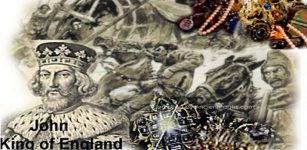 ‘Bad King John’ Of England: His Lost Treasures Have Never Been Found
Featured Stories | Apr 6, 2016
‘Bad King John’ Of England: His Lost Treasures Have Never Been Found
Featured Stories | Apr 6, 2016 -
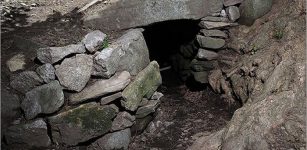 Ancient Mystery Of Upton Chamber Cave In Massachusetts: One Of The Largest Ancient Man-Made Structures In New England
Featured Stories | Oct 10, 2017
Ancient Mystery Of Upton Chamber Cave In Massachusetts: One Of The Largest Ancient Man-Made Structures In New England
Featured Stories | Oct 10, 2017 -
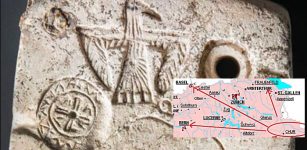 1,000-Year-Old Multi-Shaped, Double-Sided Mold For Jewelry Found In Swiss City Of Chur
Artifacts | Jul 26, 2020
1,000-Year-Old Multi-Shaped, Double-Sided Mold For Jewelry Found In Swiss City Of Chur
Artifacts | Jul 26, 2020 -
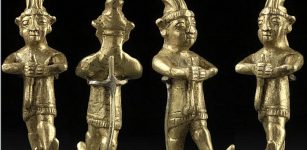 Golden Figurine From Yozgat Depicts Unknown Hittite God
Artifacts | May 11, 2016
Golden Figurine From Yozgat Depicts Unknown Hittite God
Artifacts | May 11, 2016 -
 Diyu – Terrible Chinese Hell And Judgement Of God Yama
Chinese Mythology | Dec 18, 2018
Diyu – Terrible Chinese Hell And Judgement Of God Yama
Chinese Mythology | Dec 18, 2018 -
 Archaeologists Begin Excavations Of A Sunken Zhiyuan Warship That Sank In 1894
Archaeology | Oct 7, 2015
Archaeologists Begin Excavations Of A Sunken Zhiyuan Warship That Sank In 1894
Archaeology | Oct 7, 2015 -
 World’s Oldest Burial Site Reveals Homo Naledi Buried Their Dead 100,000 Years Before Humans
Archaeology | Jun 6, 2023
World’s Oldest Burial Site Reveals Homo Naledi Buried Their Dead 100,000 Years Before Humans
Archaeology | Jun 6, 2023 -
 Mystery Of The Lost Biblical Kadesh Where Moses Was Punished By God
Biblical Mysteries | Oct 17, 2017
Mystery Of The Lost Biblical Kadesh Where Moses Was Punished By God
Biblical Mysteries | Oct 17, 2017 -
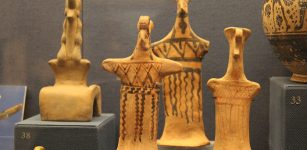 Mycenaean Culture Used Lignite For Their Kilns 3,000 Years Ago – Surprising Discovery Reveals
Archaeology | Jan 25, 2022
Mycenaean Culture Used Lignite For Their Kilns 3,000 Years Ago – Surprising Discovery Reveals
Archaeology | Jan 25, 2022 -
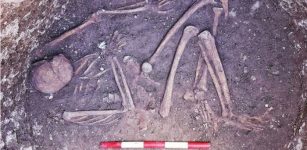 Rare Iron Age Crouch Burial Discovered At The Margate Caves Site In Kent, UK
Archaeology | Mar 8, 2018
Rare Iron Age Crouch Burial Discovered At The Margate Caves Site In Kent, UK
Archaeology | Mar 8, 2018 -
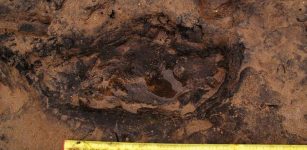 Rare Ancient Human Footprints Found On Gower Peninsula, Wales Are 7,000 Years Old
Archaeology | Mar 8, 2017
Rare Ancient Human Footprints Found On Gower Peninsula, Wales Are 7,000 Years Old
Archaeology | Mar 8, 2017 -
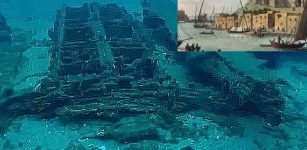 Ancient Roman Port Discovered Off The Syrian Coast
News | Feb 16, 2021
Ancient Roman Port Discovered Off The Syrian Coast
News | Feb 16, 2021 -
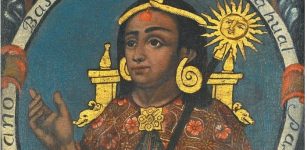 On This Day In History: Last Inca Emperor Atahualpa Captured By Francisco Pizarro – On Nov 16, 1532
News | Nov 16, 2016
On This Day In History: Last Inca Emperor Atahualpa Captured By Francisco Pizarro – On Nov 16, 1532
News | Nov 16, 2016 -
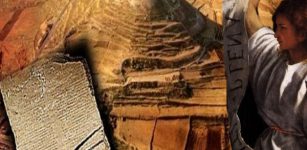 Mystery Of The Second Gabriel Stone And The Man Resurrected By Archangel Gabriel
Biblical Mysteries | Sep 10, 2018
Mystery Of The Second Gabriel Stone And The Man Resurrected By Archangel Gabriel
Biblical Mysteries | Sep 10, 2018 -
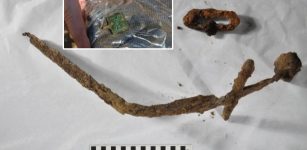 Crusader-Era Sword Discovered At Previously Unknown Burial Site In Finland
Archaeology | Oct 16, 2023
Crusader-Era Sword Discovered At Previously Unknown Burial Site In Finland
Archaeology | Oct 16, 2023 -
 Pre-Columbian Casarabe People In The Amazon Developed A Unique Drainage And Irrigation System
Archaeology | Jan 29, 2025
Pre-Columbian Casarabe People In The Amazon Developed A Unique Drainage And Irrigation System
Archaeology | Jan 29, 2025 -
 Atlit Yam – Fate Of The 9,000-Year-Old Underwater Megalithic Site With A Huge Stone Circle
Featured Stories | Jun 14, 2021
Atlit Yam – Fate Of The 9,000-Year-Old Underwater Megalithic Site With A Huge Stone Circle
Featured Stories | Jun 14, 2021 -
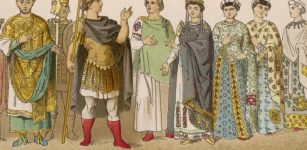 Justinianic Plague: Modeling Study Challenges Death Rate And Severity Of Infectious Disease
Archaeology | May 4, 2020
Justinianic Plague: Modeling Study Challenges Death Rate And Severity Of Infectious Disease
Archaeology | May 4, 2020

